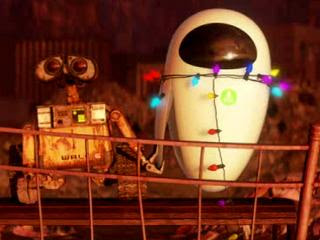WALL-E: The Lonely Robot Who Finds Love
Some would call the animated "WALL-E" (2008), directed by Andrew Stanton, the top animated film of all time. Truly, it is difficult to find fault with this film, but I'm not making that call here. This is a quality animated film that definitely is at the top of the recent pile along with "Beauty and the Beast" and a few others. But virtually all recent animated films are done with exquisite quality and detail, so saying one is "the best" is simply pointless. One will be "the best" if its particular focus and theme speaks to you.
The plot is fairly original, and has a valuable lesson for kids. This is the kind of thing that will stick with them when they grow up, so if you want them to become aware of the ecology and how important it is to not trash planet Earth, this film is a must-see.
It is the future. Earth has been abandoned by mankind because it has become covered in trash. The powerful multi-national conglomerate "Buy N Large" (personified by CEO Fred Willard) is responsible. WALL-E (Ben Burtt) is a garbage collecting robot who has been left to clean things up.
WALL-E is fascinated with the things that have been left behind. He finds Earth's history and culture fascinating. He is alone except for a pet cockroach.
One day, EVE (Elissa Knight), a sleek (and dangerous) reconnaissance robot, arrives. She has been sent to find out if life is once again sustainable. WALL-E rescues EVE from a storm and shows her around. Of course, he falls in love with her.
When WALL-E shows Eve a plant growing amongst the trash, things change. Following her programming, she automatically enters a deactivated state. All that is left of her is a blinking green beacon. WALL-E then tries to figure out how to bring his love back to life.
Rather than having just a rote tale designed to showcase its lovable characters (such as, oh, getting kicked out of your simple village by some mean guy and then having to find your way back), this film actually becomes philosophical about loneliness and alienation. It is very sophisticated, but at the same time, very down to earth in its focus on love.
Pixar was at the top of its game when it made "WALL-E." It borrows from the classic Stanley Kubrick film "2001: A Space Odyssey," which is undeniable and which is the case with a lot of other films, too. This film, though, is not a remake, but instead has its own distinct style and themes. Comparing the two is pointless. "2001" was ground-breaking, solidified the careers of people who wound up making "Star Wars" and other classics, and dealt with profound philosophical issues in the context of the manned space program and man's glorious future (which, at the time of that film, seemed shaky). "WALL-E" is a wonderful love story, primarily (but certainly not exclusively) aimed at younger viewers that is another in a seemingly endless series of quality products turned out by the Disney/Pixar machine. If you enjoy it more, then it is the better film for you. It certainly is more accessible for a general audience and especially younger viewers, with its cute robots and quirky love story and over-arching theme of loneliness. That doesn't make it "better" in the grand sense unless that is how you, reading this, choose to define quality, which is perfectly fine if that works for you. If you're hungry, a quick crust of bread may be more satisfying to you than a seven-course meal. It seems a clear choice, however, as to which film is the more "influential," and I don't think that's even debatable. Be that as it may, this may well be "the Pixar movie for people who don't like Pixar films." My biggest complaint is that it seems too short, but maybe that's just because I enjoyed it so much.
The film is kind of sad in a way. We are made to sympathy with these robots, but the future inevitably is a dead end for their kind. Still, it is a wonderful tale about how love can grow in the strangest places.
Well worth giving a shot. You may wind up enjoying it more than you thought you would.


























0 comments:
Post a Comment